As the impacts of anthropogenic climate disruption (ACD) continue to escalate, drought, wildfires, flooding and other extreme weather events continue to intensify and last longer as a result.
In parts of Africa, the sociopolitical translation of this means wars over water, crops and animals, as drought and the ensuing conflict spinning out of it have become the norm.
In the United States, this looks like ever-increasing food prices, growing evidence of overt animosity towards the government, and increasing economic and health concerns about what the future holds as drought, wildfires and temperature extremes continue to intensify.
As a growing number of US citizens wonder what they might be able to do to take care of themselves as this dystopian future comes into focus, silver linings are emerging from the darkening clouds.
One of them is a small farm on the outskirts of one of the largest cities in the country.
 (Photo: Dahr Jamail)
(Photo: Dahr Jamail)
More Than a Farm
The 23-acre Blackwood Educational Land Institute grows everything from peaches, pears and plums to kale, broccoli and figs, constitutes three ecosystems (Piney Woods, Black Prairieland and Savannah Post Oak), runs a community-supported agriculture (CSA) operation, and hosts yoga retreats, wilderness first-responder training and children’s education programs.
One would not expect a place like this to be only a half-hour drive from downtown Houston, Texas, nestled within an area not known for having progressive politics, let alone making advanced preparations for ACD.
Hans Hansen, the horticulturist who oversees the gardening operations at Blackwood, told Truthout he is already acutely aware of the need to make adjustments for what is already well underway.
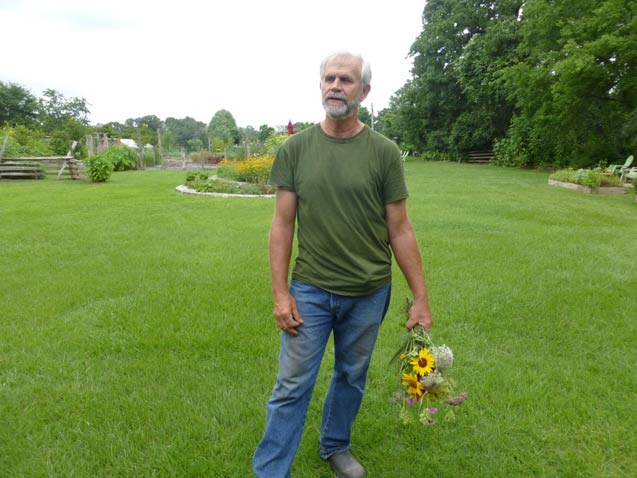 Horticulturist Hans Hansen, with the Blackwood Educational Land Institute since it started in 1989, hopes their work creates a “basic language to communicate to as many sectors of the community as we can.” (Photo: Dahr Jamail)
Horticulturist Hans Hansen, with the Blackwood Educational Land Institute since it started in 1989, hopes their work creates a “basic language to communicate to as many sectors of the community as we can.” (Photo: Dahr Jamail)
“We’re having to adapt our crops and techniques to climate change and the growing season changes that it is causing,” Hansen explained. “And my goal is to raise consciousness levels in Southeast Texas in regards to our relationship with the planet, as well as growing food.”
The institute, founded in 1989, is small-scale, sustainable, organic and functions as a CSA: It provides regular shipments of food to distribution points in Houston so that people there have access to affordable, organic produce.
Hansen is optimistic about the future of agriculture on a local level, in that he believes Houston “has shifted in recent years from post-modern thinking to having sectors that are taking a leadership role in sustainable food and where it intersects with the culinary world.”
Cath Conlon, the president and CEO of the institute, believes that not only will we be healthier and happier if we learn how to feed ourselves, but that we must also concentrate on learning other skills for self-sufficiency.
“We provide Wilderness First Responder (WFR) training to all our [nature camp] counselors,” she said. “But also with kids who come here who are graduating college. Look at our medical system . . . people don’t know how they are going to be taken care of. So hopefully by giving training, we can help alleviate that concern.”
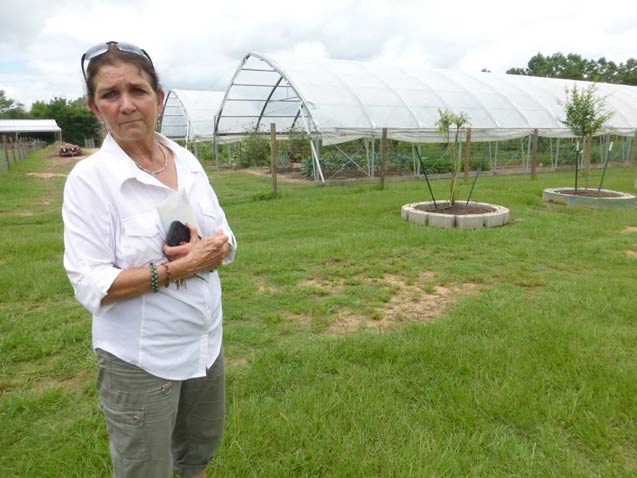 Cath Conlon, the president and CEO of the Blackwood Educational Land Institute. (Photo: Dahr Jamail)
Cath Conlon, the president and CEO of the Blackwood Educational Land Institute. (Photo: Dahr Jamail)
Currently Blackwood has direct working relationships with eight middle and high schools, which have incorporated the institute’s work into their curriculum.
Conlon believes society needs people within every workplace environment who know how to take care of themselves and others during an emergency, as well as on an organic, basic living level.
“We offer that kind of training here, in that we grow our own food, we offer the WFR training, we compost, and we stress conscious living,” she said. “We also model social justice, supporting environmental issues, and how to support our health and spirit. I don’t know of other places around here that teach all this.”
The institute is sustained, according to Conlon, by “grants, gifts, and hard work. But mostly hard work.”
Using permaculture and biodynamic farming, the institute aims to “work towards creating the world we want to live in, here and now,” Conlon said.
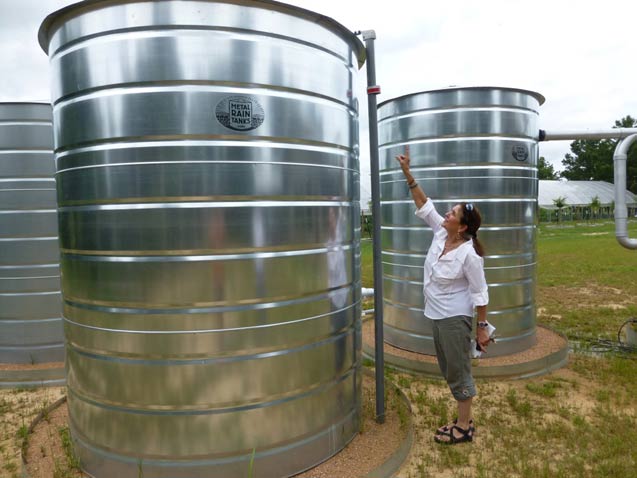 Conlon showing the water level of all the rainwater harvesting tanks used at the institute. (Photo: Dahr Jamail)
Conlon showing the water level of all the rainwater harvesting tanks used at the institute. (Photo: Dahr Jamail)
Nine people work at the institute and on the farm, which also harvests rainwater for all of its drinking and irrigation needs.
When the farm hosts nature camps, WFR trainings, yoga retreats and gardening classes, all of the participants are fed directly from what the farm produces.
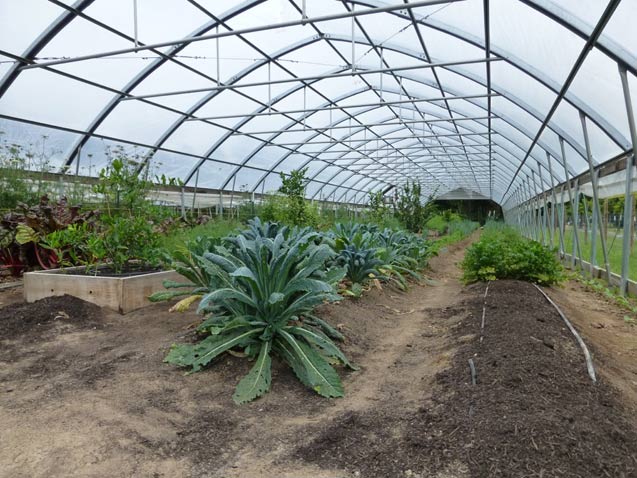 In addition to being a CSA provider, the farm feeds everyone who attends workshops and retreats at the institute. (Photo: Dahr Jamail)
In addition to being a CSA provider, the farm feeds everyone who attends workshops and retreats at the institute. (Photo: Dahr Jamail)
“We teach folks about riparian corridors, how to manage a canoe and kayak, water safety, how to cook, religious tolerance, and conflict management,” Conlon added. “We also bring in 20 kids from Taiwan and mix them in with local kids for mutual learning, in something we call the Mandarin Camp.”
The institute also participates in Bioneers, a group that describes itself as working to provide and promote “visionary solutions for the world’s most pressing environmental and social challenges.” Bioneers does so, in part, by holding annual national and local conferences, hosting radio programs and engaging in extensive media outreach.
Conservation and Renewal
“The garden is like someone’s body,” Conlon explained. “All our land here was raped because they used fertilizers and grew hay which locked up the natural process. So we had to rehab this land, just as humans sometimes need drug rehab, the land goes through the same processes.”
Hansen agreed.
“Our theme is the parallels with the body of the earth and the human body, and soil is like the microflora in our gut,” he said. “I like to have people relate to the land as part of their body and to integrate this understanding.”
 Teachings and practices at the institute meld spirit, mind, body and earth. (Photo: Dahr Jamail)
Teachings and practices at the institute meld spirit, mind, body and earth. (Photo: Dahr Jamail)
Hansen aims to do all the work at the institute “with a sense of spirit, intelligence and compassion” in the hope that these values might spread.
However, as the city of Houston continues to undergo another economic boom driven by fracking and the ongoing expansion of the oil and gas industry, both Hansen and Conlon are worried about encroachment as the city grows.
“I would think others around here would be concerned about the encroachment too,” Conlon said. “I mean, where will kids go to be able to see how food grows?”
Nevertheless, the institute’s work continues to grow; it already has several students from nearby high schools who want to work there, and apparently that is what will be necessary as the institute looks to the future.
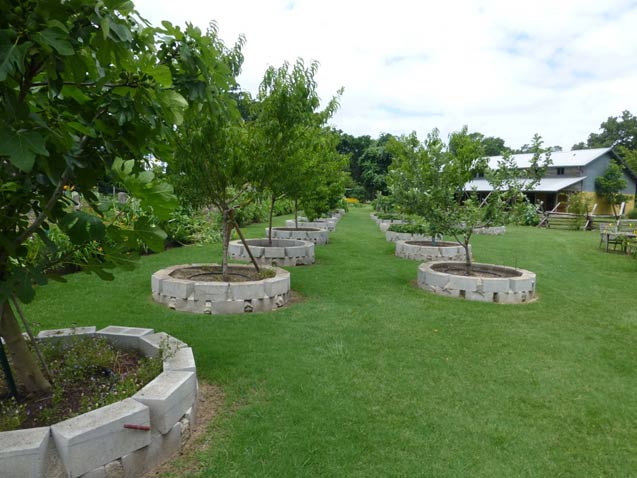 Although small, the institute continues to slowly grow in size and personnel over time. (Photo: Dahr Jamail)
Although small, the institute continues to slowly grow in size and personnel over time. (Photo: Dahr Jamail)
“It takes every person here to keep all the moving parts working,” Conlon said. “And we’re always looking at how we can stay ahead of the curve, to keep learning and growing and adapting, along with the planet.”
Given the advancement of ACD and what this means for our ability to feed and care for ourselves, Blackwood farm could well be a model for our collective future.
Our most important fundraising appeal of the year
December is the most critical time of year for Truthout, because our nonprofit news is funded almost entirely by individual donations from readers like you. So before you navigate away, we ask that you take just a second to support Truthout with a tax-deductible donation.
This year is a little different. We are up against a far-reaching, wide-scale attack on press freedom coming from the Trump administration. 2025 was a year of frightening censorship, news industry corporate consolidation, and worsening financial conditions for progressive nonprofits across the board.
We can only resist Trump’s agenda by cultivating a strong base of support. The right-wing mediasphere is funded comfortably by billionaire owners and venture capitalist philanthropists. At Truthout, we have you.
We’ve set an ambitious target for our year-end campaign — a goal of $150,000 to keep up our fight against authoritarianism in 2026. Please take a meaningful action in this fight: make a one-time or monthly donation to Truthout before December 31. If you have the means, please dig deep.
